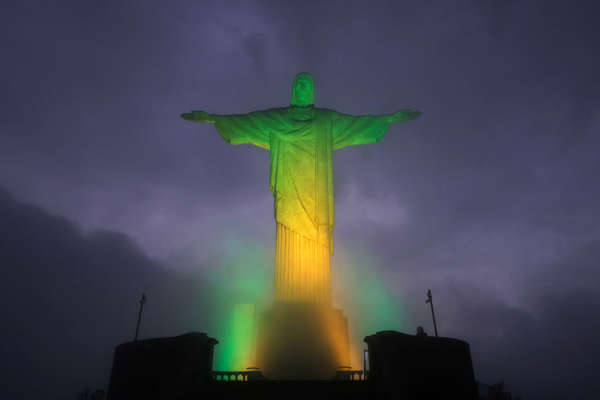As Brazil woke up to its first day without footballing legend Pelé, his face shone on buildings across the South American nation and landmarks were lit up and fans took to the streets dressed in his iconic number 10 shirt in his memory.
With front pages in the country all talking about Pelé, the country’s government declared three days of national mourning.
The last time national mourning was declared was when Queen Elizabeth II died. With him being the closest Brazil had to royalty, lots of parallels have been drawn between the two.
Supporters started gathering outside São Paulo's Albert Einstein hospital the previous afternoon when they heard news of Pele's death.
The hospital issued a statement confirming his death from multiple organ failure connected to his cancer. But in a reflection of his status, it added that it shared the suffering felt by the family and everyone over the loss of "our beloved King of football".
Pelé scored a world record of 1,281 goals in 1,363 appearances during a 21-year career, including 77 goals in 92 matches for his country. The only player to win the World Cup three times, lifting the trophy in 1958, 1962 and 1970, Pelé was named FIFA’s Player of the Century in 2000.
But he was a cultural icon, too. As a Black man, he rose to the status of national treasure in a country with a deep history of slavery and legacy of segregation that persists. He regularly faced monkey chants on the pitch and was called several racist nicknames.
But he once said that if he had stopped every game after a monkey taunt, he would have had to stop them all. Pelé was key to carving out space and recognition for Black people in Brazilian football, his biographer Angelica Basthi has said, but he was never directly involved in the fight against racism.
While national mourning will last for three days, São Paulo state authorities have said their period of mourning will go on for a week. But Brazilians will mourn for much longer as the Christ the Redeemer statue in Rio has been illuminated in green and yellow after Pele’s death.
Pelé's wake will be held on Monday at the Santos Football club - for many years, his home stadium. The following day, his coffin will be carried through the streets of the coastal city of Santos, before a private burial.
This weekend was expected to be momentous in Brazil as Luiz Inácio Lula da Silva returns to the presidency, 20 years after the start of his first term in office. Instead, Brazilians will be paying tribute to a man who transcended politics - a man who represented this entire footballing nation.











